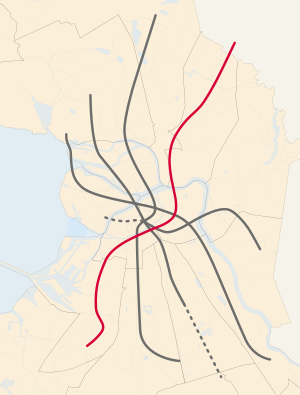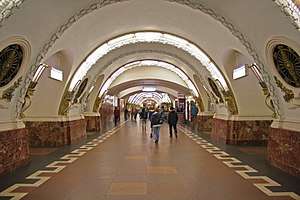Line 1 (Saint Petersburg Metro)
| Kirovsko-Vyborgskaya | |||||||||||||||||||||||||||||||||||||||||||||||||||||||||||||||||||||||||||||||||||||||||||||||||||||||||||||||||||||||||||||||||||||||||||||||||||||||||||||||||||||||||||||||||||||||||||||||||||||||||||||||||||||||||||||||||||||||||||||||||||||||||||||||||||||||
|---|---|---|---|---|---|---|---|---|---|---|---|---|---|---|---|---|---|---|---|---|---|---|---|---|---|---|---|---|---|---|---|---|---|---|---|---|---|---|---|---|---|---|---|---|---|---|---|---|---|---|---|---|---|---|---|---|---|---|---|---|---|---|---|---|---|---|---|---|---|---|---|---|---|---|---|---|---|---|---|---|---|---|---|---|---|---|---|---|---|---|---|---|---|---|---|---|---|---|---|---|---|---|---|---|---|---|---|---|---|---|---|---|---|---|---|---|---|---|---|---|---|---|---|---|---|---|---|---|---|---|---|---|---|---|---|---|---|---|---|---|---|---|---|---|---|---|---|---|---|---|---|---|---|---|---|---|---|---|---|---|---|---|---|---|---|---|---|---|---|---|---|---|---|---|---|---|---|---|---|---|---|---|---|---|---|---|---|---|---|---|---|---|---|---|---|---|---|---|---|---|---|---|---|---|---|---|---|---|---|---|---|---|---|---|---|---|---|---|---|---|---|---|---|---|---|---|---|---|---|---|---|---|---|---|---|---|---|---|---|---|---|---|---|---|---|---|---|---|---|---|---|---|---|---|---|---|---|---|---|---|---|---|---|
|
| |||||||||||||||||||||||||||||||||||||||||||||||||||||||||||||||||||||||||||||||||||||||||||||||||||||||||||||||||||||||||||||||||||||||||||||||||||||||||||||||||||||||||||||||||||||||||||||||||||||||||||||||||||||||||||||||||||||||||||||||||||||||||||||||||||||||
 | |||||||||||||||||||||||||||||||||||||||||||||||||||||||||||||||||||||||||||||||||||||||||||||||||||||||||||||||||||||||||||||||||||||||||||||||||||||||||||||||||||||||||||||||||||||||||||||||||||||||||||||||||||||||||||||||||||||||||||||||||||||||||||||||||||||||
| Overview | |||||||||||||||||||||||||||||||||||||||||||||||||||||||||||||||||||||||||||||||||||||||||||||||||||||||||||||||||||||||||||||||||||||||||||||||||||||||||||||||||||||||||||||||||||||||||||||||||||||||||||||||||||||||||||||||||||||||||||||||||||||||||||||||||||||||
| Type | Rapid transit | ||||||||||||||||||||||||||||||||||||||||||||||||||||||||||||||||||||||||||||||||||||||||||||||||||||||||||||||||||||||||||||||||||||||||||||||||||||||||||||||||||||||||||||||||||||||||||||||||||||||||||||||||||||||||||||||||||||||||||||||||||||||||||||||||||||||
| System | Saint Petersburg Metro | ||||||||||||||||||||||||||||||||||||||||||||||||||||||||||||||||||||||||||||||||||||||||||||||||||||||||||||||||||||||||||||||||||||||||||||||||||||||||||||||||||||||||||||||||||||||||||||||||||||||||||||||||||||||||||||||||||||||||||||||||||||||||||||||||||||||
| Status | Operational | ||||||||||||||||||||||||||||||||||||||||||||||||||||||||||||||||||||||||||||||||||||||||||||||||||||||||||||||||||||||||||||||||||||||||||||||||||||||||||||||||||||||||||||||||||||||||||||||||||||||||||||||||||||||||||||||||||||||||||||||||||||||||||||||||||||||
| Termini |
Devyatkino Prospekt Veteranov | ||||||||||||||||||||||||||||||||||||||||||||||||||||||||||||||||||||||||||||||||||||||||||||||||||||||||||||||||||||||||||||||||||||||||||||||||||||||||||||||||||||||||||||||||||||||||||||||||||||||||||||||||||||||||||||||||||||||||||||||||||||||||||||||||||||||
| Stations | 19 | ||||||||||||||||||||||||||||||||||||||||||||||||||||||||||||||||||||||||||||||||||||||||||||||||||||||||||||||||||||||||||||||||||||||||||||||||||||||||||||||||||||||||||||||||||||||||||||||||||||||||||||||||||||||||||||||||||||||||||||||||||||||||||||||||||||||
| Operation | |||||||||||||||||||||||||||||||||||||||||||||||||||||||||||||||||||||||||||||||||||||||||||||||||||||||||||||||||||||||||||||||||||||||||||||||||||||||||||||||||||||||||||||||||||||||||||||||||||||||||||||||||||||||||||||||||||||||||||||||||||||||||||||||||||||||
| Opened | 1955 | ||||||||||||||||||||||||||||||||||||||||||||||||||||||||||||||||||||||||||||||||||||||||||||||||||||||||||||||||||||||||||||||||||||||||||||||||||||||||||||||||||||||||||||||||||||||||||||||||||||||||||||||||||||||||||||||||||||||||||||||||||||||||||||||||||||||
| Owner | Saint Petersburg Metro | ||||||||||||||||||||||||||||||||||||||||||||||||||||||||||||||||||||||||||||||||||||||||||||||||||||||||||||||||||||||||||||||||||||||||||||||||||||||||||||||||||||||||||||||||||||||||||||||||||||||||||||||||||||||||||||||||||||||||||||||||||||||||||||||||||||||
| Technical | |||||||||||||||||||||||||||||||||||||||||||||||||||||||||||||||||||||||||||||||||||||||||||||||||||||||||||||||||||||||||||||||||||||||||||||||||||||||||||||||||||||||||||||||||||||||||||||||||||||||||||||||||||||||||||||||||||||||||||||||||||||||||||||||||||||||
| Line length | 29.57 km (18.4 mi) | ||||||||||||||||||||||||||||||||||||||||||||||||||||||||||||||||||||||||||||||||||||||||||||||||||||||||||||||||||||||||||||||||||||||||||||||||||||||||||||||||||||||||||||||||||||||||||||||||||||||||||||||||||||||||||||||||||||||||||||||||||||||||||||||||||||||
| Track gauge | 1,524 mm (5 ft) | ||||||||||||||||||||||||||||||||||||||||||||||||||||||||||||||||||||||||||||||||||||||||||||||||||||||||||||||||||||||||||||||||||||||||||||||||||||||||||||||||||||||||||||||||||||||||||||||||||||||||||||||||||||||||||||||||||||||||||||||||||||||||||||||||||||||
| |||||||||||||||||||||||||||||||||||||||||||||||||||||||||||||||||||||||||||||||||||||||||||||||||||||||||||||||||||||||||||||||||||||||||||||||||||||||||||||||||||||||||||||||||||||||||||||||||||||||||||||||||||||||||||||||||||||||||||||||||||||||||||||||||||||||

Kirovsko-Vyborgskaya Line (Russian: Кировско-Вы́боргская ли́ния, the line between the city's Kirovsky District and Vyborgsky District) is the oldest line of the Saint Petersburg Metro, opened in 1955. The original stations are very beautiful and elaborately decorated, especially Avtovo and Narvskaya. The line connects four out of five Saint Petersburg's main railway stations. In 1995, a flooding occurred in a tunnel between Lesnaya and Ploschad Muzhestva stations and, for nine years, the line was separated into two independent segments (the gap was connected by a shuttle bus route). The line is also one of the two lines in the network to feature shallow stations, the other being the Nevsko-Vasileostrovskaya Line.
The line cuts Saint Petersburg centre on a northeast-southwest axis. In the south its alignment follows the shore of the Gulf of Finland. In the north it extends outside the city limits into the Leningrad oblast (it is the only line to stretch beyond the city boundary). The Kirovsko-Vyborgskaya Line generally coloured red on Metro maps.
Timeline
| Segment | Date opened | Length |
|---|---|---|
| Ploshchad Vosstaniya to Avtovo | November 15, 1955 | 9.4 km |
| Pushkinskaya | December 30, 1956 | N/A |
| Ploshchad Vosstaniya to Ploshchad Lenina | June 1, 1958 | 3.0 km |
| Avtovo to Dachnoye (temporary) | June 1, 1966 | 1.5 km |
| Ploshchad Lenina to Akademicheskaya | April 22, 1975 | 8.8 km |
| Politekhnicheskaya | December 29, 1975 | N/A |
| Avtovo to Prospekt Veteranov | September 29, 1977 | 3.5 - 1.5 km* |
| Akademicheskaya to Devyatkino | December 29, 1978 | 4.9 km |
| Total: | 19 Stations | 29.6 km |
* Upon the 1977 extension, the temporary station Dachnoye (which had been the terminus since 1966) and its tracks were demolished.
Name changes
| Station | Previous name(s) | Years |
|---|---|---|
| Devyatkino | Komsomolskaya | 1978–1991 |

Transfers
| Transfer to | At |
|---|---|
| Tekhnologichesky Institut | |
| Ploshchad Vosstaniya | |
| Vladimirskaya | |
| Pushkinskaya |
The transfer on Tekhnologichesky Institut is a cross-platform one. Last transfer to the Frunzensko-Primorskaya Line has opened via Pushkinskaya in 2008.
Rolling stock
Two depots serve the line, Avtovo (№ 1) and Severnoe (№ 4), although when the lines separated in 1995 the Severnoe served the northern section whilst the Avtovo, along with other depots took over the southern section. As there was a large surplus in the north, conventional railway was used to transfer many of the trains to other depots. Upon the reunification of the two sections, the Severnoe depot's park was restored and the line became the first to start using eight-carriage trains, of which currently 34 and 20 trains are assigned respectively to the metro. Most of them are E, Em, Ema, and Emx trains built in the 1960s and 1970s.
Recent developments and future plans
| Wikimedia Commons has media related to Kirovsko-Vyborgskaya Line. |
Given the age of most of the stations on this line, constant renovations take place to restore them. The Vladimirskaya and Narvskaya stations closed for reconstruction from autumn 2006 until 2008. Debate continues over whether to open the controversial mosaic of Stalin (located on Narvskaya station behind the service room) to the public. As of 2016 discussions have begun on extending the line southward.
| Saint Petersburg Metro Lines | |
|---|---|
| Lines under construction or proposed | |
| List of Saint Petersburg Metro stations | |